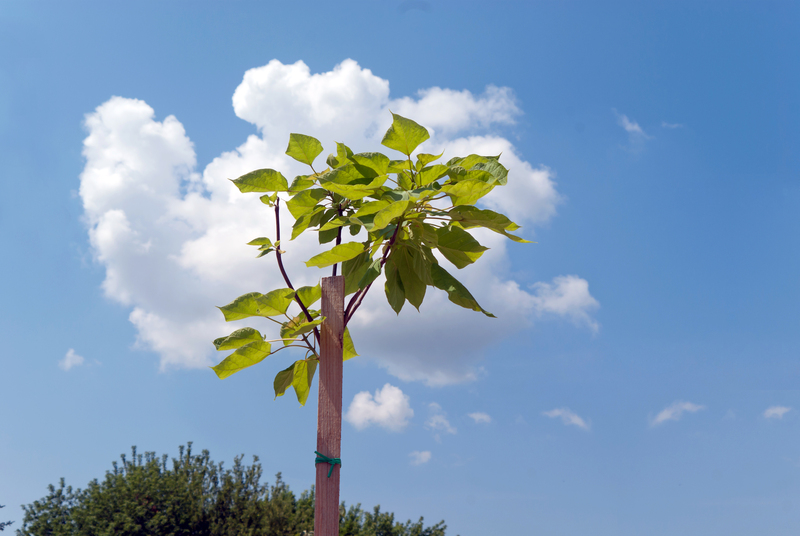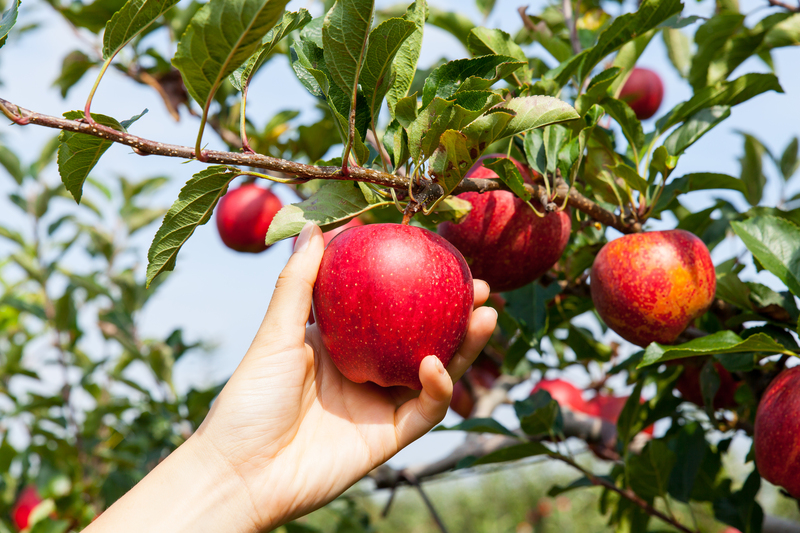Organic Alchemy: Waste Becomes Fertile, Nutritious Soil
Posted on 14/08/2025
Organic Alchemy: Waste Becomes Fertile, Nutritious Soil
In a world striving for sustainability, the transformation of organic waste into lush, nutritious soil stands out as a powerful practice. Known as organic alchemy, this process turns kitchen scraps and garden refuse into fertile earth, reducing landfill waste while nurturing gardens and farms alike. But what exactly is this organic transformation, and how can you harness its benefits in your own life? Let's dive into the remarkable world where waste is reborn as fertile soil.
Understanding Organic Alchemy: Turning Waste Into Life
Organic alchemy isn't just poetic--it's science in action. This process involves the decomposition of organic materials by a host of microorganisms, resulting in humus-rich compost that improves soil structure, enhances nutrient content, and supports vibrant plant growth.
- Reduces Greenhouse Gas Emissions by minimizing methane production in landfills.
- Improves Soil Fertility by returning essential nutrients to the earth.
- Supports Circular Economy by transforming waste into valuable resources.
Composting, vermiculture, and biodegradation are all part of the toolkit for this transformation. By harnessing the magic of microbial life, we can practice genuine organic alchemy in our gardens, communities, and farms.

The Science Behind the Magic: How Waste Turns Into Nutritious Soil
Stages of Composting: From Scraps to Rich Humus
1. Fresh Waste Collection
- Kitchen Scraps - vegetable peels, fruit rinds, coffee grounds
- Garden Waste - grass clippings, dead leaves, plant prunings
- Other Organics - shredded newspaper, cardboard, wood chips
2. Microbial Feast
When these organic materials are piled together, billions of bacteria, fungi, and other microorganisms begin to break down complex compounds. The pile heats up, sometimes reaching over 50?C (120?F), accelerating decay and killing off many weed seeds and pathogens.
3. Breakdown and Transformation
After the initial heat, activity slows. Specialized organisms--like earthworms and actinomycetes--step in, further deconstructing material into simpler forms.
4. Mature Compost Emerges
What remains is a dark, crumbly humus--packed with nutrients and beneficial microbes--ready to be added to gardens and farm fields.Key Ingredients in Organic Soil Alchemy
- Carbon-rich Browns (dead leaves, straw, cardboard)
- Nitrogen-rich Greens (kitchen waste, grass cuttings)
- Moisture - essential for microbial life and chemical reactions
- Oxygen - necessary for aerobic decomposition and odor prevention
The perfect balance of these elements ensures a thriving ecosystem within your compost pile, transforming waste into fertile ground.
Benefits of Recycling Organic Waste Into Fertile Soil
The advantages of turning organic waste into fertile, nutritious soil are as rich as the compost itself. Here's why you should embrace this ancient-yet-modern practice:
- Soil Health Enhancement: Compost restores soil structure, improves water retention, and boosts populations of helpful microbes.
- Natural Fertilization: It supplies slow-release nutrients--nitrogen, phosphorus, potassium--essential for robust plant growth.
- Waste Reduction: Diverts significant waste from landfills, saving space and reducing municipal costs.
- Reduced Chemical Usage: Lessens dependence on synthetic fertilizers and harmful pesticides.
- Carbon Sequestration: Healthy organic soil can capture and store carbon, mitigating climate change.
- Economic Savings: Generates free fertilizer for gardens, reducing household and farm input costs.
Composting Methods: Ways to Practice Organic Alchemy
Traditional Backyard Composting
This is perhaps the most familiar method of turning waste into nutritious soil. Piles or bins are used to layer "browns" and "greens", with occasional turning to introduce air.
- Pros: Simple, cost-effective, suitable for most climates
- Cons: Takes months to mature; can attract pests if not managed correctly
Vermiculture: Worm-Powered Soil Crafters
Harness the appetite of earthworms! Red wigglers consume food scraps, producing rich vermicompost teeming with nutrients and beneficial bacteria.
- Pros: Faster results, compact, ideal for small spaces
- Cons: Sensitive to temperature and acidity; needs regular maintenance
Bokashi: Fermentation Fast-Track
An efficient method using beneficial microbes to rapidly ferment organic material, even meat and dairy, in airtight containers. After fermentation, the pre-composted material is buried or added to a compost pile to finish breaking down.
- Pros: Fast, odorless, compact, handles food types avoided by traditional compost
- Cons: Final stage required before use in soil
Industrial & Community Composting
Municipal programs and larger systems process massive amounts of organic matter, turning city-wide waste into high-quality compost for farms, parks, and landscaping.
- Pros: Large volumes processed, controls landfill input, fosters community sustainability
- Cons: Requires infrastructure and community participation
Organic Alchemy in Action: Real-World Success Stories
Urban Gardens Transforming Neighborhoods
Across cities worldwide, community gardens are using food waste from households or restaurants to grow fresh produce. Not only does this reduce landfill contributions, but it also brings neighborhoods together with a shared purpose--the cultivation of healthy soil and food.
Zero-Waste Kitchens & Restaurants
Eco-conscious chefs are embracing composting as a way to manage food scraps. The result? Vibrant herbs and vegetables grown in homemade organic soil, creating a farm-to-table loop that inspires both staff and patrons.
Regenerative Farms Leading the Way
Regenerative agriculture is rooted in building and preserving soil health. Many farms integrate livestock manure, cover crops, and composted crop waste back into the land, closing the nutrient loop and boosting long-term yields.
Step-by-Step Guide to Home Composting
Ready to try organic alchemy for yourself? Here's how to start composting at home and create rich, nutritious soil with ease:
- Choose a Composting System: Select a system that fits your space and lifestyle--pile, bin, tumbler, or worm bin.
- Collect Your Browns and Greens: Alternate layers of carbon (browns) and nitrogen (greens) for a balanced pile.
- Maintain Moisture: Keep your compost as damp as a wrung-out sponge.
- Turn or Stir: Aerate your compost regularly to accelerate decomposition and prevent odors.
- Harvest, Cure, and Use: After a few months, sift out uncomposted bits, let the finished compost cure for a few weeks, then spread it on your garden.
Avoid These Composting Pitfalls
- Don't add meat, dairy, or oily foods to traditional compost--they attract pests and slow decomposition.
- Avoid diseased plants and weed seeds unless your pile regularly gets hot enough to kill pathogens.
- Maintain enough moisture and air. Too dry or too wet slows the process.
- If it smells bad, add more browns, turn more often, or reduce food waste input.
Nutrient Cycling: The Secret Engine of Organic Alchemy
What makes organic waste alchemy so potent is nutrient cycling. As bacteria and fungi break down organic materials, they unlock stored nutrients, making them available for new plant growth. Rather than relying on artificial fertilizers--which often leach away and pollute waterways--compost enriches soil naturally and safely.
Major Nutrients in Compost
- Nitrogen: Supports leafy growth and rich, green foliage
- Phosphorus: Essential for root development and flower production
- Potassium: Helps build strong stems and resistance to disease
- Micronutrients: Trace minerals like calcium, magnesium, iron, and zinc round out the nutritional profile
Soil life thrives when compost is added--not only plants but the vast, unseen ecosystem of earthworms, beetles, mycorrhizal fungi, and beneficial bacteria. These collaborators continue the alchemy, making nutrients more accessible for all forms of life.
Compost and Climate: Organic Alchemy for the Planet
Turning waste into fertile, nutritious soil is a simple yet powerful way individuals and communities can address climate change. Here's how:
- Landfill Diversion: Every ton of food waste composted instead of dumped saves space and reduces methane emissions.
- Carbon Storage: Healthy, organic-rich soil sequesters more carbon than depleted farmland.
- Reduced Synthetic Fertilizer Use: Compost replaces some or all chemical fertilizers, which are often energy-intensive to produce and can be harmful to the environment if over-applied.
- Resilience: Compost-grown soils are better at holding water, reducing runoff and drought impacts.
Myths and Realities of Organic Soil Alchemy
Myth 1: Composting Attracts Rodents and Smells Bad
Fact: Properly managed compost, with the right ratio of browns to greens, adequate aeration, and no meat or dairy, should be pleasantly earthy and unattractive to pests.
Myth 2: Composting Takes Too Long
Fact: While passive piles can take months, active turning, shredding inputs, or adding worms can yield usable compost in as little as 4-6 weeks!
Myth 3: Only Gardeners Need Compost
Fact: Every household produces organic waste. Even if you don't garden, donating to community gardens or municipal composting programs maximizes the impact of your effort.
Organic Alchemy for the Future: Closing the Loop
Globally, food and organic waste represent as much as one-third of all landfill inputs, leading to resource loss and environmental harm. By embracing organic alchemy, we can transform this challenge into fertile opportunity--growing food, enriching soil, and combatting climate change.
"The alchemy of turning waste into soil is nothing less than the art of growing life from death; a living example of nature's cycle of renewal."

Quick Tips for Successful Organic Soil Alchemy
- Chop or shred materials to speed up decomposition.
- Keep your pile moist but not soggy.
- Balance browns and greens--always cover food waste with dry material.
- Turn your pile regularly to keep air flowing and microbes happy.
- Place your bin/right site - sunny locations speed up composting in cooler climates, but avoid excessive heat in hot regions.
- Use finished compost generously--as a mulch, soil amendment, or in potting mixes.
Conclusion: Embrace Organic Alchemy -- Turn Waste Into Wealth
Organic alchemy--the transformation of waste into fertile, nutritious soil--is an accessible, practical, and profoundly restorative practice. Whether you're working on a small balcony, in a backyard garden, or advocating for city-wide composting, every bit of organic waste diverted from landfill makes a difference.
Join the movement: Start with your own food scraps and garden waste. Experience firsthand how organic soil, born from yesterday's waste, can nurture tomorrow's food and flowers. Through composting and other forms of organic recycling, we're not just growing plants--we're cultivating a future where nothing is wasted, and everything has value.
Let this be your invitation to participate in organic soil alchemy--and transform waste into a legacy of abundance!
Latest Posts
Crafting Your Own Miniature Garden: The Container Gardening Approach
Spark Imagination with a Kid-Appropriate Garden
Navigate your first garden with 9 crucial beginner tips
Craft a Harmonious Zen Garden with Innovative Design Ideas
Weather-Wise: Ensuring Your Garden's Survival in Severe Storms

